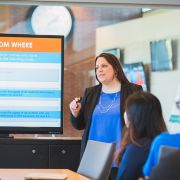- On this Page
- Majors
- Minors
- Certificates
- Undergraduate Bulletin
- Laptop Requirement
Undergraduate Majors
Not sure where to start? Check out how different subjects connect to our majors to see which could be right for you.

B.S., Artificial Intelligence Methods and Applications
Learn to design, implement, evaluate, and deploy AI-based solutions for real-world applications.

B.S., Cybersecurity Analytics and Operations
Protect information, discover security vulnerabilities, and communicate the risks and impacts of cyberattacks.

B.S., Data Sciences
Analyze data to discover patterns and uncover insights that can inform better decisions.

B.S., Enterprise Technology Integration
Connect IT, AI, cloud, databases, and business intelligence to transform organizations.

B.S., Human-Centered Design and Development
Identify, design, build, and evaluate interactive technologies that enhance people’s lives.

B.S., Information Sciences and Technology
Understand core information technologies, their practical applications, and their impact on our world.

B.S., Information Technology Ethics and Compliance
Understand core information technologies, their practical applications, and their impact on our world.

B.S., Security and Risk Analysis
Address the security and risk challenges facing individuals, organizations, and the nation.
Undergraduate Minors

Minor, Digital Media Trends and Analytics

Minor, Entrepreneurship and Innovation

Minor, Global Security

Minor, Information Sciences and Technology

Minor, IST for Aerospace Engineering

Minor, IST for Earth and Mineral Sciences

Minor, IST for Industrial Engineering

Minor, IST for Labor Studies and Employment Relations

Minor, IST for Mathematics

Minor, IST for Telecommunications

Minor, IST in Health Policy Administration

Minor, Security and Risk Analysis

Minor, Supply Chain and IST

What’s the Bulletin?
On each Degree page, you’ll see references to the Undergraduate Bulletin. The Bulletin is Penn State’s comprehensive guidebook for academic information and program requirements. It lists:
- all of the degree programs, majors, and minors you can choose
- the Suggested Academic Plan for the classes you’ll need to take
- General Education requirements
- links to information about tuition and financial aid
- information about grading and graduation
- links to the many resources available to support you as a student at Penn State
Student Laptop Requirement
The College of IST requires all students at University Park to have a personal laptop that meets minimum technical specifications. This ensures you have the technology you'll need to complete coursework, collaborate with your peers, and build digital fluency to prepare you for your future career.



